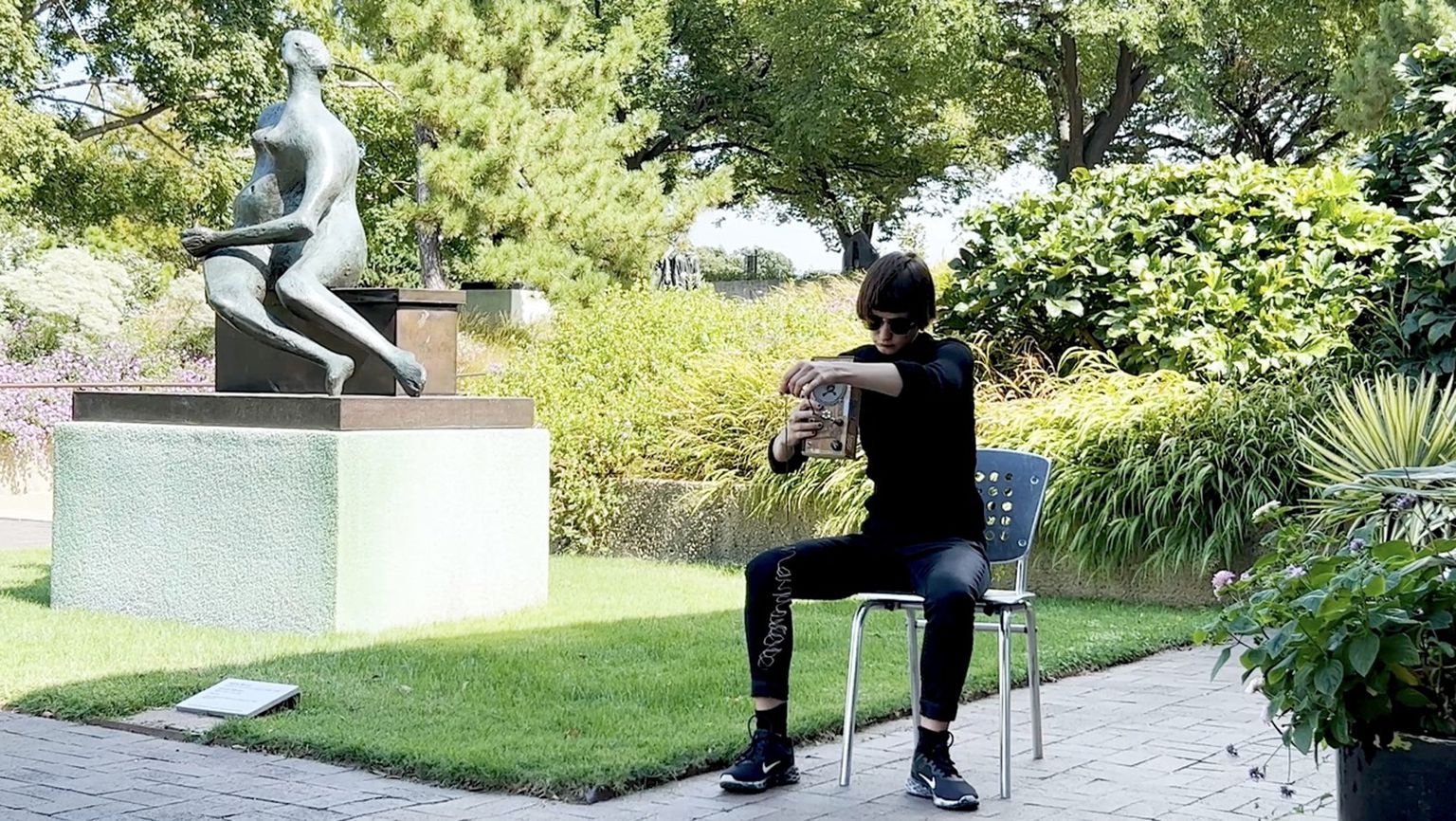
On 17 June, during a concert by improviser and violinist Biliana Voutchkova at the NOASS floating arts space, which was organised by the Skaņu mežs festival and Shape+ platform, the audience were also treated to a performance by the duo Bad Groupy comprised of Kris Kuldkepp and Jeff Surak. Kuldkepp also works as a solo artist. We invited her for a quick chat.
Kris was born in Estonia, but now lives and works in Hamburg. Explaining her background, the artist says, “I’ve got a classic musical education, but right now all I’m creating is improvised music. When you’re on stage, you don’t know what the outcome will be. It’s always fun experimenting with unexpected situations.”
Kris’s solo works are not just comprised of sound art and experimental music, but also interactive performances in which she engages the public. In contrast, the focus of Bad Groupy, her project together with Jeff Surak, is creating spontaneous experimental sounds. They have released an album The Last Piece of Graphite (Binaural Recording), which is a binaural recording (the kind that reacts with both ears).
The duo create sounds using contact microphones, egg whisks, Walkmans, copper poles and double bass, mutating everyday noises into different free improvisation aesthetics.
The thing that Kriss Kuldkepp and Biliana Voutchkova have in common is Berlin concert life where improvised musical events take place a lot more often than in Hamburg. Kuldkepp is a member of a group of researchers “Kinetic Sound and Space”, which focuses on special sound, post-humanist ideas and participatory performance art. And our conversation is also about innovations and future visions.
How do you view the concept of “innovation” in contemporary music? Sometimes it seems as if everything has already been tried, said and done.
Yeah, I’m inclined to agree – looking back at the history of music, we can see that really innovative accomplishments occurred during the 14th century, whereas these days technological innovations are a step ahead of every endeavour.
For example, artificial intelligence is very popular right now, but I don’t think it’s a precondition for innovation.
Every day, I work with cutting edge technologies, which help me to achieve a very pure sound. But in concerts, we use analogue technologies. We take items that exist in a completely different context. For example, things you can find in the kitchen and integrate them into music. I think that innovation is happening all the time with the help of different items. It all depends how you view them. Innovation can be a way how various elements are specifically used. With artists in mind, using innovations doesn’t immediately make an artist more interesting.
You mentioned artificial intelligence. As an artist and creative person, what do you think about the opportunities it offers?
Right now, I’m in the final stages of my doctoral thesis in which I study the concept of post-humanism, which can also be considered from the perspective of artificial intelligence and superhuman or human improvement. Likewise, this subject can also be examined from a philosophical perspective, which I find more interesting. Seeking a definition for the concept of the “human being” and “humanity” these days, I also touched upon artificial intelligence. Viewed from a political perspective, one could say that a human is defined as a specific person. As artificial intelligence becomes increasingly relevant, it seems that the concept of the “human being” is experiencing a crisis, because something has emerged that seems to be human and thinks like a human, but is not a human being.
Do you see a place for artificial intelligence in your works?
I don’t want to use artificial intelligence in my artwork. I could use it in a collaboration or research project. I don’t agree with this argument that artificial intelligence will take away art or be a better creator of art than human beings. That which artificial intelligence can achieve has already been done and added to its database. It can be exciting to use artificial intelligence in art, but there’s no reason to fear that using it will deprive art of its value. In regard to technologies as a whole, there’s always a good question – who creates them and who benefits from them? Going back to artificial intelligence, it is trained using works whose creators have not received all the credits they deserve and which often represent marginalized groups.
Therefore this becomes a political question. Maybe the current focus on artificial intelligence is highlighting this issue, which existed beforehand. And for those who come from an alternative, experimental musical stage, this is a topical issue.
Part of me doesn’t want to release music. On the other hand, I understand how much publishing and promoting music on the internet benefits my opportunities to go on creating music, which is my whole life. But even so, I think that this artificial intelligence trend is captivating – digital expansion deletes time and space from our accustomed existential space.
The artist has the innovative ability to imagine the space of the future based on a small element of the present.
Yes, that’s part of an artist’s work – to take the ideas flowing around and to create your own utopia. I like the idea that any concert or composition you hear is part of life’s utopia.
Click on this link to listen to Kris Kuldkepp’s album Moonutatud Muundused / Distorted Conversions.